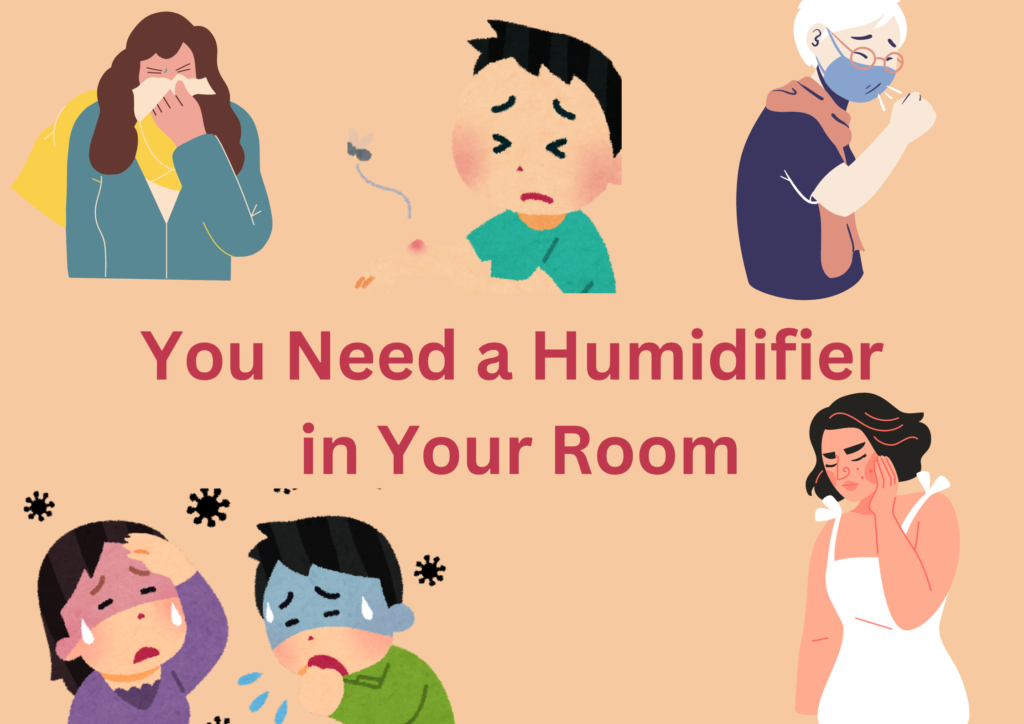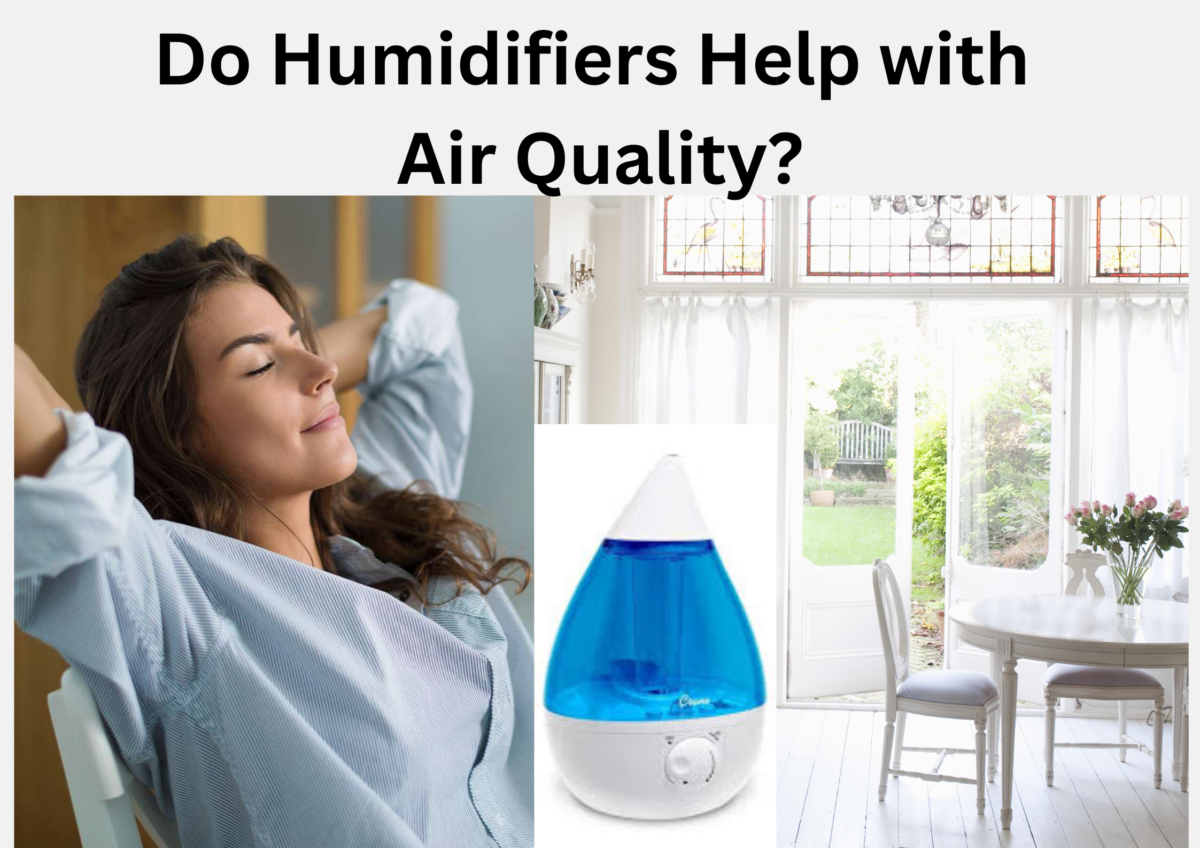To lead a healthy life, you should breathe easily and comfortably and for this, you should consider the air quality of your surroundings. Do humidifiers help with air quality? And the answer is yes. Humidifiers play a vital role in improving air quality. It protects you against several respiratory diseases, reduces allergies, helps you breathe comfortably, keeps your skin moisturized, improves your sleep, and protects your home and its furniture and plants.
A humidifier does not collect dust as an air purifier but, improves the air quality by adding moisture into the air. Humidifiers work on the principle of natural moisture-adding mechanism and provide several health benefits.
This article explains in detail a commonly asked question “Do Humidifiers Help with Air Quality?”. Read the full article to get a clear idea about it.
Importance of Indoor Air Quality
According to the United States Environmental Protection Agency, Americans spend 90% of their time indoors. Indoors are generally referred to in built environments such as homes, offices, schools, gyms, etc.
Indoor air quality is defined as air quality in an indoor environment. Indoor air quality is a global issue. Poor indoor air quality can cause a range of health issues including simple respiratory tract irritation, allergic reactions, cognitive deficits, heart disease, cancer, etc. According to the World Health Organization, approximately 3.8 million people die yearly due to diseases related to harmful indoor air.
- The COVID-19 virus SARS-CoV-2 spreads through the air almost exclusively indoors. So, it is very important to improve the quality of the indoor air that help reduce the spread of SARS-CoV-2 viruses.
- Besides COVID-19 viruses there are so many other viruses are there like influenza, and respiratory viruses that spread through the air and cause illness. A healthy indoor air can reduce the spreading of these viruses.
- Cleaner and healthier air decreases the severity of asthma and allergies. It also improves productivity and cognition.
- If the indoor air quality is healthy, it means the air protects you from outdoor air pollutants, such as smog, wildfire smoke, etc.
- Clean indoor air offers a protection layer to people with disabilities, children, older adults, frontline workers of hospitals, grocery stores, schools, etc.
- Good indoor air quality protects people against temperature rise, various chemicals in home products, inadequate ventilation, high or low humidity, etc.

Relationship Between Humidity Level and Indoor Air Quality
To understand the importance of improving the air quality of your room or home, it is necessary to know the relationship between humidity level and indoor air quality first. Humidity can be defined as the amount of water vapor present in the air. Relative humidity is calculated by dividing the amount of water vapor present in the air by the amount of moisture the air can hold at a given temperature.
Relative Humidity=
(Amount of water vapor in the air(g/m^3))/(Amount of moisture the air can hold at a given temperature (g/m^3))×100
According to the Environmental Protection Agency (EPA), the humidity level of the room should be maintained in the range of 30% to 50%. If the relative humidity level of a room is less than 30%, it is known as low humidity and if the air’s humidity level is above 50% it is called high humidity.
Low humidity level:
Moisture or, water vapor can weigh down bacteria, viruses, or particles of other pollutants and fall them down. If the surrounding air’s humidity level is low, it means the air contains less moisture and the air is very dry. In dry air, the viruses and bacteria spread more rapidly and circulate through your breathing space. Again, in dry air, the mucus membranes become dry and it irritates the nose and the nasal passageways. It becomes more difficult for the body to fight germs that cause cold, flu, and other respiratory diseases.
Dry air often causes:
- Dry and itchy eyes, skin and scalp
- Dry and cracked lips
- Increases asthma and allergic symptoms
- Nose bleeds, nasal congestion, cough
High Humidity Level:
High humidity level in the air increases the concentrations of some indoor air pollutants. When the humidity level rises above 50%, the air becomes heavy with moisture.
- A highly moisturized air supports bacterial growth and increases dust mites, molds, allergens, etc. This leads to respiratory diseases like asthma, allergies, etc.
- Mold and mildew need moisture to propagate and spread. The presence of mold leads to asthma, allergies, respiratory diseases, fungal infections, etc.
- If the air’s humidity level is high, it reduces air circulation and traps pollutants and other particles in the air.
- High humidity level increases the heat index in the air, which leads to heat-related illnesses.
How Humidifiers Work?
Humidifiers add moisture to the air. It supplies the water vapor mist into the air and increases its humidity level. A balanced humid air reduces the spread of viruses and improves air quality.
If you find a relatively low humidity level in the room or, dryness in the air, the installation of a humidifier can help you in many ways. It increases the humidity level of the room, prevents your skin, eyes, and mucus membranes from drying out, and saves you from various respiratory diseases. Sleeping beside a humidifier can also reduce snoring problems and offer you good sleep.
Nowadays different types of humidifiers are available in the market such as evaporative humidifiers, ultrasonic humidifiers, central humidifiers, impeller humidifiers, etc.
Do Humidifiers Help with Air Quality?
Humidifier maintains the recommended humidity level of a room or an entire home, by keeping it between 30% to 50%. While a humidifier may not remove mold, dust, bacteria, or contaminants completely from the air, it still improves the air quality of the surrounding air by keeping the humidity level at optimal value. It emits water vapor or cool mist into the air and increases the moisture in the indoor air.
A humidifier cannot collect the dust from the air like an air purifier. It cannot completely remove the particles and the contaminants from the air. It adds moisture to the air that pulls down the particles, airborne viruses, contaminants, bacteria, etc. to the ground and so that they can not spread in the air. The airborne viruses can not survive on the surface for a long time. Thus a humidifier makes the indoor air healthier, and cleaner to breathe and improves air quality.
During winter the temperature decreases, and the humidity level also decreases which leads to dry air. In dry air, the virus, germs, and bacteria can spread more rapidly. Thus, it increases the likelihood of contracting airborne illnesses, such as colds, flu, cough, etc. Dry air makes the nasal passageways and mucus membranes dry. This leads to severe respiratory diseases like asthma, allergic infections, etc. Humid air moistens the nasal passageways and improves the immunity level of the body against viruses and bacteria.
The humidifier maintains the optimal humidity level of the surrounding air, improves the air quality, and offers several benefits such as
- Protects the body from airborne viruses, flu, etc.
- Reduces the severity of asthma and allergic infections
- Keeps your skin and scalp hydrated, healthy and moisturized
- Improves sleep quality
- Decreases snoring
Considerations for Using Humidifiers to Improve IAQ
A humidifier is a great device to maintain the humidity level of surrounding air. At the same time, it is also very important to note that a dirty humidifier can create an unhealthy environment. It is necessary to clean the humidifier to reduce the risk of spreading these dust particles, contaminants, bacteria, etc. in the air. A healthy person can develop harmful symptoms from a dirty humidifier.
- Wash and dry out the humidifier’s water tank after each use. Before cleaning the humidifier just make sure that the humidifier is unplugged.
- Read the manufacturer’s manual and follow the instructions for deep cleaning of the humidifier.
- To clean the different parts of a humidifier use proper cleaning products and tools such scrubbing brush, cleaning solution, etc.
- Replace or, clean the filter on a regular basis to maintain proper hygienic condition.
- Clean the humidifier before and after getting it out for storage.
- Use distilled water to reduce the spread of minerals in the air.
- Use a hygrometer to measure the humidity level of a room. Don’t over-humid the air of your room.
Potential Drawbacks of Using a Humidifier
- A dirty humidifier can cause bacterial growth that leads to cough, cold, and allergic infections due to unhealthy air. Steam vaporizers can get dirty quickly.
- A warm-mist humidifier often causes burns and injuries.
Conclusion
If you use a humidifier properly, it helps to improve the quality of the surrounding air and makes the air more comfortable to breathe. It also helps people with various respiratory diseases, dry skin problems, allergic infections, asthma, etc. But always remember that it is a home remedy and not a medical treatment. If you are using it for medical purposes then consult your doctor first.
FAQS
- Is it bad to sleep with a humidifier every day?
No, it is not bad to sleep with a humidifier every day rather it is a very safe and useful device. It maintains the humidity of indoor air at a recommended level and keeps the air healthy to breathe.


28 thoughts on “Do Humidifiers Help with Air Quality? 2024”